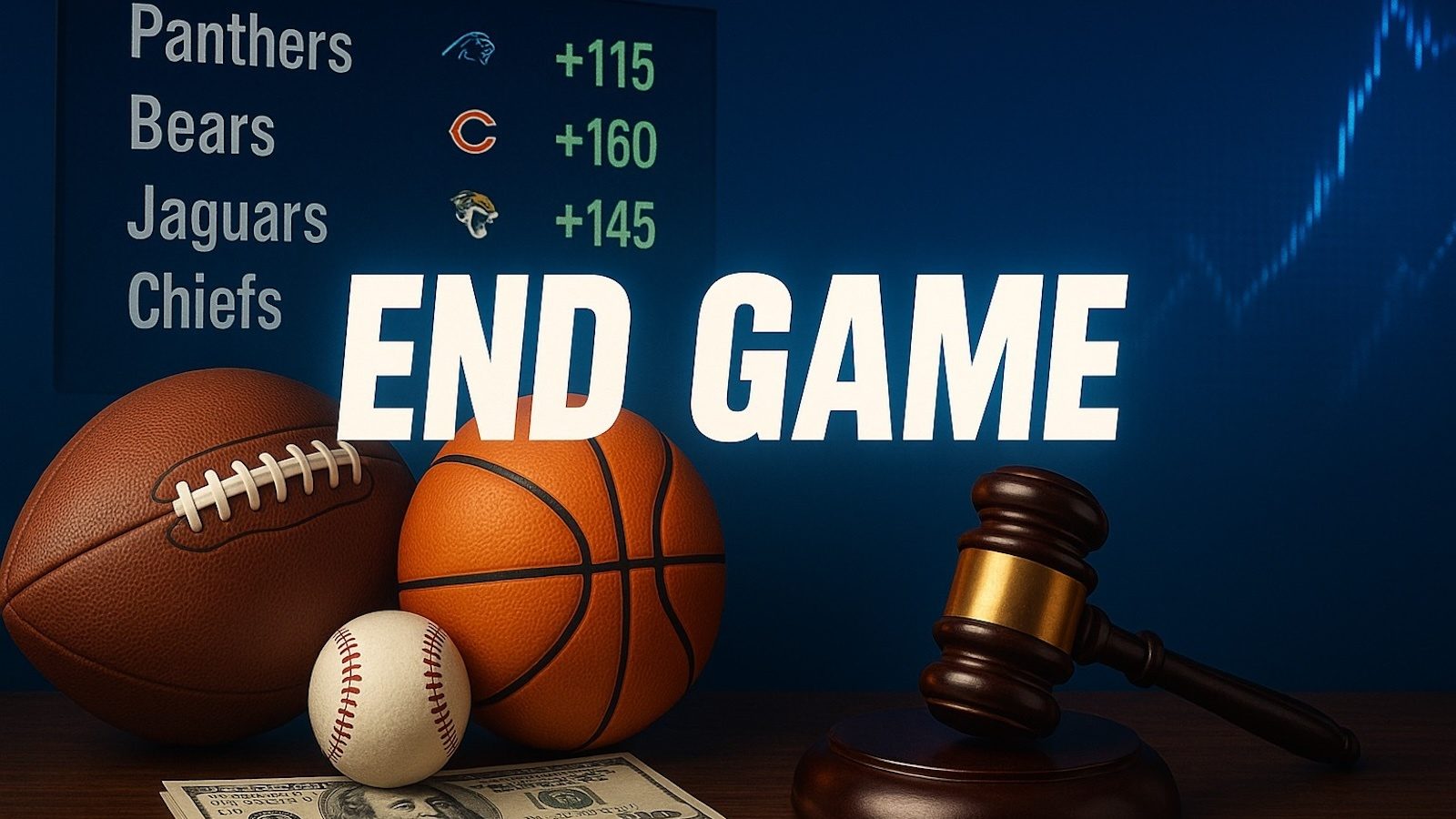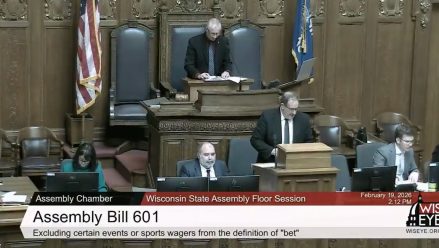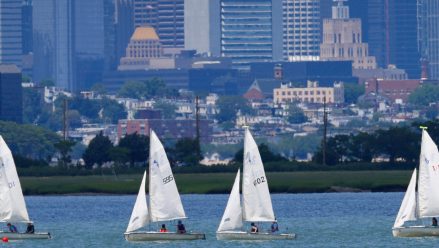The U.S. sports betting world moves quickly and unpredictably in 2025. In order to properly take stock of it all, we offer InGame’s “EndGame,” an end-of-week compilation of the top storylines, some overlooked items, and all the other news bits from this past week that we found interesting.
NJ gambling probe nets mafia, athletes
The descriptions of two men charged in a wide-reaching, mafia-backed sports gambling ring match two former Rutgers University wrestlers, the New York Times reported Friday. Fourteen people were arrested in connection with the alleged New Jersey betting ring this week.
According to the attorney general’s press release, the alleged illegal gambling ring was financed by known Lucchese crime family member Joseph M. (Little Joe) Perna of Fairfield, N.J. His son, Joseph R. Perna, allegedly ran the operation and recruited his peers to participate –including his cousin Michael Cetta and Nicholas Raimo, the Rutgers wrestlers.
The attorney general charged Pernas and several others with racketeering, conspiracy, gambling offenses and money laundering. According to the release, an investigation into an illegal gambling ring based in Essex and Bergen counties was opened in January 2024. Between 2022-24, the alleged gambling ring “transferred approximately $2 million in suspected gambling transactions” and included bookmakers in New Jersey, Rhode Island, and Florida.
NY bill would ban most prediction contracts
Filed last Friday, a New York bill would effectively prohibit five kinds of prediction market contracts, including those on sporting events. Prediction markets are defined in the bill as “a system that allows consumers to open a speculative position on the outcome of future events, in a bid-ask format. This definition shall include all forms of prediction markets regardless of the mechanisms or structures used for opening speculative positions on future events.”
There are also specific definitions for “athletic event markets,” “catastrophic event markets,” “death markets,” “political markets,” and “security markets,” all of which would be banned.
A09251 was referred to the Consumer Affairs and Protection Committee. The New York State Legislature has adjourned for the year, but the bill could carry over to 2026.
Per the text of the bill, operators who choose to offer markets would have to adhere to responsible gambling guidelines, including making the minimum age 21, banning funding accounts with credit cards, and creating responsible gambling and self-exclusion programs. In addition, the state attorney general would have the right to issue an injunction against any operator that violates the bill should it become law, and those that continue to operate after such a warning would be subject to a fine of $1 million per day.
Wholesale betting changes on table in MA
Saying he was sorry that he voted to allow sports betting in 2022, Massachusetts State Sen. John Keenan on Thursday brought a bill that would drastically change wagering in the Bay State before the Joint Committee on Economic Development and Emerging Technologies. S 302 would eliminate prop bets, ban gambling advertising during live sports events, and raise the sports betting tax from 20% to 51% of adjusted gross revenue.
“When I voted to legalize sports betting, I never thought it would become what it is,” Keenan told the committee. “We unleashed an industry that now promotes betting on anything and everything imaginable and unimaginable all over the world, 24 hours a day, every single day.
“I deeply regret my vote and I want to publicly apologize to those who have lost the opportunity to sit and watch a game just for the enjoyment of the game. I want to apologize to those who find themselves in the dark spaces of betting addiction and to those working through recovery, and to their families and friends. I want to apologize to those who have lost loved ones to suicide because of gambling issues.”
There was no vote on the bill. The Massachusetts General Assembly is in session year-round, and bills may be carried over to 2026.
Fanatics considering prediction markets?
The Financial Times on Friday reported that Fanatics Betting & Gaming is “in talks” to partner with Crypto.com to offer a prediction market product, though neither company commented for the story. Crypto.com is already live with its prediction market and is partnered with Underdog to offer sports event contracts in 16 U.S. states.
The report comes on the heels of Flutter announcing ahead of its Wednesday earnings call that it will go live with FanDuel Predicts, including sports event markets, in partnership with CME next month. DraftKings previously announced that it will launch its prediction product “in the coming months” after acquiring the already licensed Railbird platform.
New idea for how tribes could fight Kalshi
Indian Gaming Association Executive Director Jason Giles on Wednesday suggested that putting a “poison pill for technology” into tribal compacts may be another avenue for Indian Country to explore in the ongoing fight against prediction markets and illegal gambling. On the “New Normal: What Kalshi’s Court Win Means for Prediction Markets and Indian Country” webinar, Giles and co-host Victor Rocha offered up the poison pill idea after three California tribes were unable to get an injunction against Kalshi operating on their lands.
Tribal lawyers, the hosts said, were preparing amicus briefs for prediction market cases in Ohio and Nevada, but the cases “won’t be won with amicus briefs.” They said tribes could work on a parallel track as they renegotiate compacts but include language that would address tech companies and possibly financial products to keep them off Indian lands.
Neither offered details, but conceptually the idea could allow tribes to take more control of how to deal with prediction markets. Nationally, tribes have argued that Kalshi offering its sports event contracts is a breach of the Indian Gaming Regulatory Act.
Wisconsin bill headed to Senate floor
Wisconsin’s Senate Committee on Agriculture and Revenue late last week passed SB 592, a bill that would give the state’s tribes exclusivity to retail and digital sports betting. The committee voted 5-3, and the bill is headed to the senate floor. The commercial sports betting industry has expressed opposition, saying the bill will prevent it from operating in Wisconsin.
The bill would change the law just enough to allow tribes to compact with the state for exclusivity under the Indian Gaming Regulatory Act, which means that any commercial partner would have to pay its partner tribe 60% of revenue. If the bill passes, tribes would first have to re-compact with the state before being able to launch digital sports betting.
Financial industry fighting against Kalshi?
Brokerage house public.com pushed back against prediction markets and the idea that the markets and financial investing are two very different products:
Perplexity wants to build your parlays
Perplexity, a Large Language Model (artificial intelligence) platform in competition with ChatGPT, began advertising on social media this week as a means to build winning sports bets.
While this feels like another baby step toward the abyss, InGame asked Perplexity, just like the bad-betting young adult male in the ad, to construct a four-leg parlay containing the Jets-Patriots game, the Pittsburgh-West Virginia men’s basketball game, and two NHL games of its choosing on Thursday.
It’ll even suggest a stake size, given the risk — in this case, $25.
The parlay, each with reasoning and clickable endnotes:

(The Maple Leafs were not actually the favorites on my app, and the parlay landed at +1226.)
The results:
- Patriots by 13. X
- WVU by 22
- Panthers won
- Maple Leafs lost X
It looks like we can all go back to making bad parlays on our own.
Brant James
Poll: Fans worried about NCAA betting rules
Nearly three quarters of respondents in a Sacred Heart University poll said that an NCAA rule change allowing student-athletes to bet on professional sports beginning on Nov. 22 makes them “question the integrity of college athletics overall.”
Among the 500 persons surveyed by GreatBlue Research, 28.4% said they were concerned “a lot” and 47.2% were “somewhat” worried. Just 3.5% claimed to be “not at all” concerned.
Student-athletes in all three divisions will remain disallowed from wagering on college games.
Brant James
OK tribes want 2020 compacts invalidated
Oklahoma’s tribes have said multiple times that they will hold off on taking action to legalize sports betting until Gov. Kevin Stitt term limits out in 2027, and Monday that Journal Record reported that the tribes officially have an ally in Attorney General Gentner Drummond.
In 2020, Stitt compacted to allow sports betting with four tribes. Since then, the compacts have been challenged, and the four tribes are now seeking to have those compacts invalidated. The Oklahoma Indian Gaming Association expelled the four tribes when the compacts were signed.
As in any state, federally recognized tribes can compact with a state to offer sports betting, but the state must also pass a law allowing wagering. There is no such law in Oklahoma.
The compacts have been deemed invalid twice by the Oklahoma Supreme Court, but in 2020 were deemed approved by the U.S. Department of the Interior and are technically in force. The tribes have taken the case to federal court, and Drummond is preparing an amicus brief in their favor, the newspaper reported.
Utes: Low point in tribal-state relations
After a federal judge dismissed their case against the state of Colorado, the Southern and Mountain Ute Tribes issued a joint press release highlighting their frustration with Gov. Jared Polis, according to CBS News.
The tribes are seeking the opportunity to offer statewide mobile sports betting, but their compact does not allow them exclusivity for it. The state has said it would welcome the tribal platforms under state regulation and taxation. But the tribes want to operate independent of state oversight.
“Colorado explicitly authorized sports betting, a Class III game, throughout the state,” the tribes wrote in the release after the dismissal. “But the State immediately stymied the ability of the Tribes to engage in that activity despite clear authorization under the Gaming Compacts, and instead, elected to benefit out-of-state gaming interests over its relationship with the Tribes. When the Tribes sought to challenge that conduct, the Administration chose to hide behind its immunity. These actions by the Polis Administration in refusing to honor the Gaming Compacts entered into with Colorado’s two federally-recognized Tribes represents one of the lowest points in State-Tribal relations in recent history.”
The Ute tribes can appeal the district court decision.
Check it out
Former New Jersey Gov. Chris Christie made a plea to keep sports betting legal in the New York Times Friday. Christie’s words are balanced, measured, and intelligent. Athletes betting on sports betting isn’t new — it’s just news, now, because it can be caught by the legal market far more easily than by state and federal prosecutors trying to infiltrate or investigate wrongdoings. Christie summed it up best here: “Regulated betting didn’t create these integrity issues. It has revealed them.”
Odds and ends
- Connecticut’s sports betting regulator Friday sent out a warning about a scheme to defraud DraftKings. The state has arrested 15 in connection with the scheme, in which consumers are approached via social media and encouraged to open an account with a credit card provided by the person who reached out. The cards are linked to stolen identities.
- After Major League Baseball announced on Monday an agreement with its wagering partners to cap prop bets at $200, the Ohio Casino Control Commission dropped its plan to eliminate the bets. Gov. Mike DeWine had called for a more broad prohibition. In an MLB press release Monday, MLB Commissioner Bob Manfred singled out DeWine “for his leadership on this issue over the last several months.”
- The Hard Rock Casino Sacramento at Fire Mountain announced the opening of a sports bar in preparation for when (if?) sports betting is legalized in California. Per KCRA, the bar has Northern California sports memorabilia, a sports ticker, and an “immersive video wall.” It was designed to be able to be converted into a sportsbook.
ICYMI on InGame
FanDuel Surrenders License, DraftKings Pulls Application Under NGCB Prediction Market Pressure
FanDuel To Offer Sports Event Contracts In New Predictions App Starting Next Month
Why Sporttrade CEO Is Bullish On DraftKings, FanDuel Even If Prediction Markets Dominate
Down And Dirty: Prosecutors Allege Intentional, Egregious Conduct In Clase And Ortiz Indictments
Clase And Ortiz Plead Not Guilty In MLB Sports Betting Scandal
Massachusetts Regulator To Operators: ‘You Are Prohibited’ From Offering Prediction Markets In State
Penn Blew Barstool and ESPN Bet, So Naturally I’m Bullish On theScore
Professor: NCAA Sports Betting Rule Change ‘Gateway To Disaster’
Illinois Per-Wager Sports Betting Tax Tops $10 Million In September







